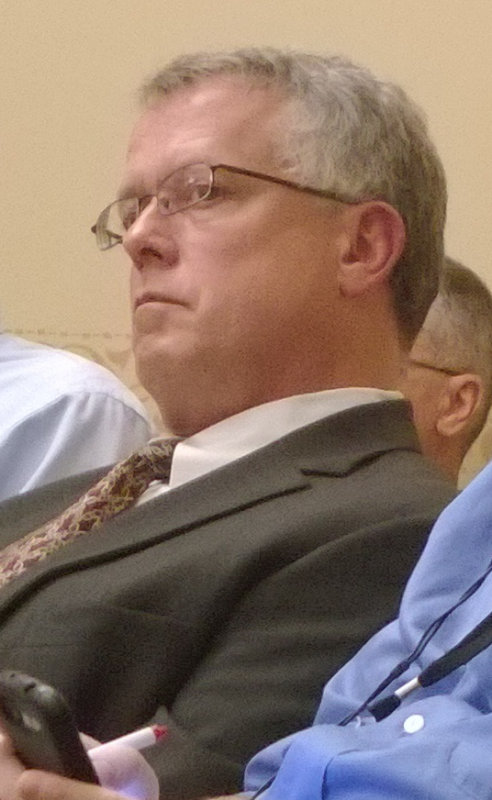Submitted by Alex Oberley on
A controversial out-of-state mining company is closer to gaining control over a 3,600-acre swath of publicly available forest near where it is planning a massive open-pit iron ore mine in northern Wisconsin. The Florida firm, Gogebic Taconite, has begun test drilling in the area and has already stirred controversy by hiring out-of-state armed security with automatic assault weapons to guard their activities. The Arizona firm was kicked out of the state after the media uncovered they were not licensed here. Now Gogebic Taconite is attempting to shut down whole forests to keep its controversial mining activities from protestors and curious eyes.
 The Wisconsin Senate Committee on Workforce Development, Forestry, Mining, and Revenue passed Senate Bill 278, which would give Gogebic Taconite the right to close the forest for up to 18 months, on a party line 3-2 vote in a hurried executive session last week. The bill is headed to the full Senate, when it reconvenes later this month.
The Wisconsin Senate Committee on Workforce Development, Forestry, Mining, and Revenue passed Senate Bill 278, which would give Gogebic Taconite the right to close the forest for up to 18 months, on a party line 3-2 vote in a hurried executive session last week. The bill is headed to the full Senate, when it reconvenes later this month.
Managed Forests Would Be Closed to Hunting, Fishing, and Winter Recreation
The land in contention has been enrolled in the state's Managed Forest Law program. Wisconsin has long encouraged landowners to maintain open and accessible forests with tax breaks. Managed forest land is used by thousands of Wisconsinites across the state, and most specifically in the vast North Woods, for hunting, fishing, hiking, sight-seeing, and cross-country skiing. The bill rushed through the Senate committee last week would turn over public access decisions to the firm.
Another option the firm has is to withdraw the land from the managed forest program, but then the company would lose its tax break, costing it some $477,000 in back taxes and a higher tax rate in the future.
"The bottom line is that they are about to shut off thousands of acres of land that is not being mined any time in the near future," with a goal, "to limit recreational activity and give a special benefit to one company alone," said Democratic Senator Bob Jauch.
Proponents of the bill say it is needed because of a June incident when a small group of protesters confronted company staff, shouting obscenities. The incident led to criminal charges against a Stevens Point woman for theft of a camera. Committee chair Republican Senator Tom Tiffany started the hearing with video of mining protesters. He repeatedly invoked the specter of "eco-terrorism" during the five-hour hearing.
In response to the June 11 incident, the company hired an Arizona-based private security firm, Bulletproof Securities. Bulletproof employees created a stir when they were spotted in camouflage and masks with automatic assault weapons in hand. The firm was ultimately removed from the site for not securing a license to operate in Wisconsin. Bob Seitz, the Gogebic lobbyist, said the firm has spent nearly a half-million dollars on Bulletproof so far, and was ready to spend much more. If Gogebic Taconite secures permission for further sampling of mineral deposits, the security firm may return.
Al Gedicks, a professor emeritus of environmental sociology at UW-La Crosse, testified at the hearing yesterday against the further militarization of mining activity and resource extraction. Comparing the presence of Bulletproof Security to "psychological warfare," he says the real target is not 15 protesters but growing resistance from 11 Indian tribes and the local communities.
Florida Firm Builds Four-Mile Pit in the Penokee Range
Referred to as "The Alps of Wisconsin," the Penokee Range has long been considered a crown jewel of the state, if not the Midwest. A pristine area with dense forest, rushing streams, and hilly ranges, people visit the area from all over the country.
Gogebic Taconite is based in Florida and is a subsidiary of the Cline Resource and Development Group of West Virginia. Billionaire CEO Chris Cline was heralded as the "New King Coal" by Bloomberg in 2010. After experiencing great windfalls with mountaintop-removal with West Virginia coal-mining, Cline wants to bring those practices to Wisconsin.
The proposed mine would be the largest in Wisconsin's history, a $1.5 billion open-pit iron ore mine stretching from Ashland to Iron counties. It would be 4½ miles long and one mile wide. Gogebic Taconite has a $20,000-a-year lease option on the mineral rights of approximately 3,600 acres in the Penokee Range. It has leased the land from RGGS Land & Minerals, LaPointe Iron Company, and Chester Co. Limited, all participants in the Managed Forest Law program. Gogebic Taconite claims it will operate for 35 years there.
Among the opponents to the mining are Wisconsin tribes, who have long been concerned about the hazards posed by this dirty extractive industry to the vital Bad River watershed. Gogebic Taconite has threatened the Bad River Band of Lake Superior Chippewa with legal action if a wetlands expert came on the mining site. Heavy industrial work such as mining is generally prohibited in wetlands; legislators already rewrote state laws earlier this year to allow mining in these ecologically vulnerable areas.
In March of this year, members of the Lac Courte Oreilles tribe began a Treaty Harvest and Education Project, often referred to as the harvest camp, in the forest near the site of the mine. The camp is both an effort to educate the public about the ecology of the region and part of a legal strategy to assert treaty rights.
"The water is sacred to our people and vitally important to the survival of the all the people in Northern Wisconsin. Tribal members depend on clean, healthy water to meet their physical, social, cultural, economic, and spiritual needs. Any activity, mining or otherwise, that threatens those resources must be the subject of careful and thorough scrutiny, including input from all aspects of Wisconsin, so a proper healthy decision can be made," states Lac Courte Oreilles Chairman Gordon Thayer.
Senator Tiffany claims the harvest camp will not be affected and they will respect native tribes' sovereignty. Yet on the radio recently he denounced the harvest camp as a "squatters' camp."
Gogebic Taconite Continues to Write WI Law
 Senator Tiffany repeatedly made clear during the public hearing this is a "narrowly designed bill," essentially written solely on Gogebic Taconite's behalf. CMD has reported previously, that the original bill permitting the iron ore mine and exempted Gogebic Taconite from major provisions of Wisconsin's environmental laws, appeared to be written by the company itself, a claim confirmed by Senate leadership. Tiffany repeatedly looked at Gogebic Taconite's lobbyist Bob Seitz as questions were raised that he could not answer about the bill.
Senator Tiffany repeatedly made clear during the public hearing this is a "narrowly designed bill," essentially written solely on Gogebic Taconite's behalf. CMD has reported previously, that the original bill permitting the iron ore mine and exempted Gogebic Taconite from major provisions of Wisconsin's environmental laws, appeared to be written by the company itself, a claim confirmed by Senate leadership. Tiffany repeatedly looked at Gogebic Taconite's lobbyist Bob Seitz as questions were raised that he could not answer about the bill.
CMD has reported that "grassroots" support for the mine has come chiefly from out-of-state Republican political organizations including David Koch's Americans for Prosperity and Club for Growth.
All Republican members on the Senate Committee on Workforce Development, Forestry, Mining, and Revenue have received significant campaign donations from the mining industry. Mine supporters contributed $15.6 million in total to Scott Walker and the Republican-controlled Legislature, reports the Wisconsin Democracy Campaign. Those contributions outweighed environmental groups opposing mining deregulation by a $610 to $1 ratio, with 79 percent of the contributions going to Republicans.
"This legislation has nothing to do with mining or job creation. It is simply a brazen act of selfishness by one out-of-state company whose owner continually demonstrates insensitivity to the neighboring communities and is too cheap to pay his responsible share like any other citizen in the managed forest land," said Senator Jauch.

Comments
Anonymous replied on Permalink
If they've already spent half a million on security
Anonymous replied on Permalink
Just wondering if the mining
lester replied on Permalink
it's not just the back